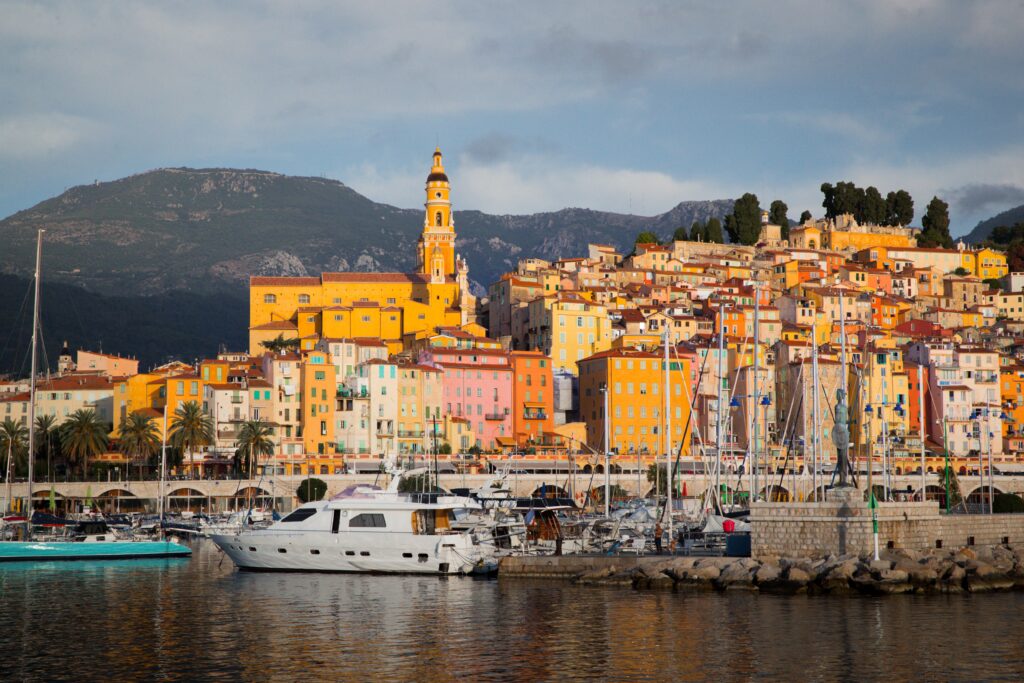VISITEZ LE DANEMARK
Bien que de petite taille, ce pays scandinave (et patrie des Lego !) a de nombreuses richesses, dont de nombreux lieux culturels, une gastronomie étoilée au Michelin et des littoraux remarquablement préservés.
Monnaie
kr - Danish krone (1kr≃ 0,13€ ≃ 0,14$ ≃0,12£)
POPULATION
5,9 millions
LANGUE
Danois
SUPERFICIE
42,943 km²
FUSEAU HORAIRE
UTC+1 / UTC+2
DRAPEAU
🇩🇰
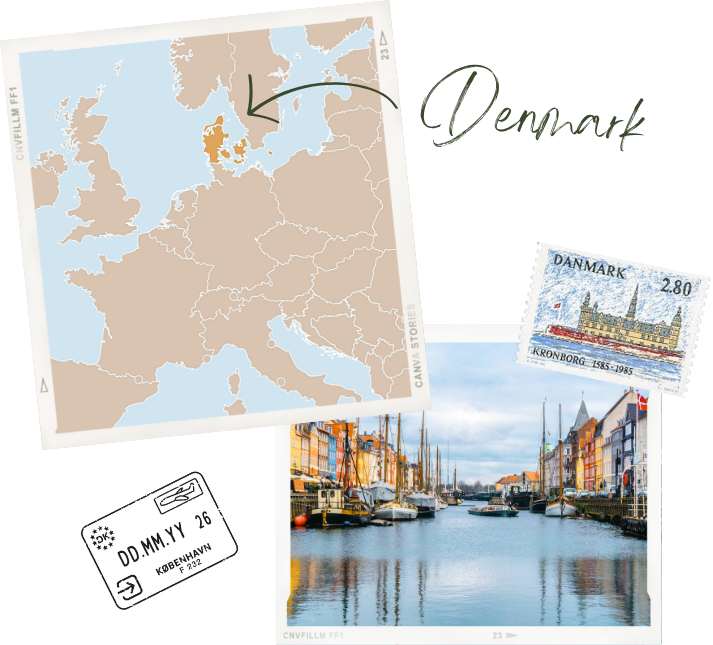

AMUSEZ-VOUS DANS LA MAISON LEGO
Située à Billund, le berceau des jouets LEGO, cette maison est également proche de Legoland et du siège du groupe Lego.

PROFITEZ DE LA NATURE À DYREHAVEN
Connu sous le nom de « Parc des Cerfs », ce parc forestier facilement accessible est réputé pour ses importantes populations de cerfs et de daims.

MONTEZ DANS UNE ATTRACTION DU PARC DE TIVOLI
Situé au cœur de Copenhague, ce parc d'attractions est un terrain de jeu pour petits et grands.

VISITEZ UNE (OU PLUSIEURS) PLAGES DANOISES
En raison de son littoral étendu, il est difficile de choisir quelle plage voir au Danemark ! Une des préférées des locaux est Søndervig.

PRENEZ UNE PHOTO À NYHAVN
Datant du XVIIe siècle, les maisons colorées du front de mer de Nyhavn sont l'un des endroits les plus photogéniques de Copenhague.
Pick a Danish destination
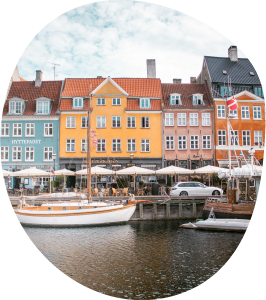
COPENHAGUE
Capital of Denmark, known for its hygge lifestyle, colorful Nyhavn harbor, and cutting-edge design.
Prepare your trip to Denmark
💡 Why visit Denmark?
Denmark is a Scandinavian country known for its charming cities, cutting-edge design, and high quality of life. It offers a perfect blend of historical heritage and modern innovation. Visitors are drawn to the charm of Copenhagen, the castles of North Zealand, and the picturesque coastline and islands. Must-see highlights include the colorful Nyhavn harbor, the historic city of Aarhus, and the iconic Little Mermaid statue.
🪪 Do I need a visa to visit Denmark?
Denmark is part of the Schengen area. Citizens of the EU, USA, Canada, Australia, and many other countries can enter visa-free for up to 90 days within a 180-day period. However, some nationalities do require a visa. It’s best to check with the nearest Danish embassy or consulate for the most up-to-date information specific to your situation.
INFORMATION IMPORTANTE: Les informations ci-dessous sont fournies à titre indicatif et s'appliquent uniquement aux visas de tourisme de courte durée. Avant votre voyage au Danemark, ou si vous envisagez de venir au Danemark dans un autre but (work, studies, …), check the official information on the European Commission website’s page about Schengen visa application: https://www.home-affairs.ec.europa.eu/
⏳ Visa-free but limited to maximum 90 days for a period of 180 days if you are a citizen of one of the following countries: Albanie; Andorre; Antigua-et-Barbuda; Argentine; Australie; Autriche; Bahamas ; Bahreïn ; Barbade ; Belgique; Bosnie Herzégovine; Brésil; Brunéi ; Bulgarie; Canada; Chili; Chine; Colombie; Costa Rica; Croatie; Chypre; Tchéquie ; Danemark; Dominique ; Le Salvador; Estonie; Finlande; France; Géorgie; Allemagne; Grèce; Grenade ; Guatemala; Honduras; Hong Kong; Hongrie; Islande; Irlande; Israël; Italie; Japon; Kiribati ; Koweit; Lettonie; Liechtenstein ; Lituanie; Luxembourg, Macao ; Malaisie; Malte; Iles Marshall; Maurice ; Mexique; Micronésie; Moldavie; Monaco; Monténégro; Pays-Bas; Nouvelle-Zélande; Nicaragua; Macédoine du Nord; Norvège; Oman; Palaos ; Panama; Paraguay ; Pérou; Pologne; Le Portugal; Qatar; Roumanie; Saint-Christophe-et-Niévès; Sainte-Lucie; Saint-Vincent-et-les-Grenadines; Samoa ; Saint Marin; Serbie; Les Seychelles; Singapour; Slovaquie; Slovénie; Iles Salomon; Corée du Sud; Espagne; Suède; Suisse; Taïwan; Timor oriental ; Tonga ; Trinité-et-Tobago; Turquie; Tuvalu; Emirats Arabes Unis; Royaume-Uni; États-Unis d'Amérique; Uruguay; Vanuatu; Vatican; Venezuela
🛂 Visa required if you are a citizen of one of the following countries: Afghanistan ; Algérie; Angola; Arménie; Azerbaïdjan; Bahreïn ; Bengladesh ; Biélorussie ; Bélize ; Bénin ; Bhoutan; Bolivie; Bostwana ; Burkina Faso; Burundi; Cambodge; Cameroun; Cap-Vert; République centrafricaine; Tchad; Chine; Comores ; Congo; Congo (Rép. Dém.); Côte d'Ivoire (Côte d'Ivoire); Cuba; Djibouti; République dominicaine; Équateur; Egypte; Guinée Équatoriale; Érythrée ; Eswatini ; Ethiopie; Fidji ; Gabon; Gambie; Ghana; Guinée; Guinée-Bissau ; Guyane; Haïti; Inde; Indonésie; Iran; Irak; Jamaïque; Jordan; Kazakhstan; Kenya; Kosovo; Koweit; Kirghizistan ; Laos; Liban; Lesotho; Libéria; Libye; Madagascar; Malawi; Maldives; Mali; Mauritanie ; Mongolie; Maroc; mozambicain ; Birmanie ; Namibie ; Nauru ; Népal; Niger; Nigeria; Corée du Nord; Oman; Pakistan; Palestine; Papouasie Nouvelle Guinée; Philippines ; Qatar; Russie; Rwanda; Sao Tomé et Principe ; Arabie Saoudite; Sénégal; Sierra Leone; Somalie; Afrique du Sud; Soudan du sud; Sri Lanka; Soudan; Surinam ; Syrie; Tadjikistan ; Tanzanie; Thaïlande; Togo; Tunisie; Turquie; Turkménistan; Ouganda; Ouzbékistan; Vanuatu; Vietnam ; Yémen; Zambie; Zimbabwe
⛅ When is the best time to visit Denmark?
❄️ December – February: Winter in Denmark is cold and dark, with temperatures ranging from -1°C (30°F) to 4°C (39°F). It’s a magical time to visit Copenhagen’s Christmas markets, though daylight hours are limited.
🌱 March – May: Spring brings longer days and blooming gardens. Temperatures slowly rise, and tourist crowds are still light. It’s an ideal time to explore cities and enjoy outdoor cafés.
☀️ June – August: Summer is the peak tourist season, with mild temperatures between 17°C (63°F) and 25°C (77°F). Festivals and events are abundant, and it’s the best time to enjoy Denmark’s coastline and islands.
🍂 September – November: Autumn is cooler, with crisp air and changing leaves. September can still be warm, while November is usually gray and rainy. It’s a quiet season with fewer tourists.
🚉 How to Get Around Denmark?
Getting around Denmark is easy and efficient, with excellent transport options:
🚌 Buses: Buses serve both local and long-distance routes, connecting smaller towns and rural areas. They are comfortable and punctual, though less frequent in remote locations.
🚂 Trains: Denmark has a well-developed rail network. Trains are modern, fast, and connect all major cities like Copenhagen, Aarhus, and Odense. Intercity and regional services are reliable.
🚗 Car Rental: Renting a car is a great option for exploring the countryside or islands at your own pace. Roads are in excellent condition, and traffic rules are strictly enforced. An International Driving Permit (IDP) is recommended if your license is not in Latin script.
💳 Can I use bank cards or cash for payments in Denmark?
Credit and debit cards are widely used in Denmark, even for small transactions. Mobile payments (like Apple Pay and GooglePay) are also popular. Visa and Mastercard are accepted almost everywhere. Some places do not accept cash, so carrying a card is essential.
🔌 What type of plugs and voltage does Denmark use?
Denmark uses three plug types: C, E, and K. They have two grounding holes. Most European plugs work, but check compatibility before you go. Denmark operates on a tension d'alimentation de 230V et une fréquence de 50Hz.
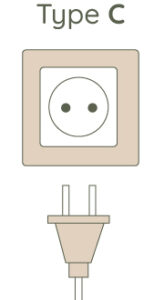
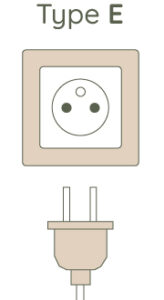
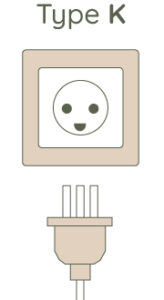
If needed, you can order an universal travel plug adapter here.
🪙 Is tipping customary in Denmark?
Tipping is not mandatory in Denmark, as service charges are included. However, rounding up the bill or leaving small change is appreciated in restaurants and cafés for good service.
🥛 Is it safe to drink tap water in Denmark?
Tap water is safe to drink throughout Denmark.
📅 When are public holidays and store closing days in Denmark?
Dimanche is a closing day for many stores. There are 10 national public holidays in Denmark:
- New Year’s Day (January 01)
- Maundy Thursday (date varies)
- Good Friday (date varies)
- Easter Monday (date varies)
- General Prayer Day (date varies)
- Ascension Day (date varies)
- Whit Monday (date varies)
- Journée de la Constitution (5 Juin)
- Christmas Day (December 25)
- Boxing Day (26 Décembre)
Ces jours-là, la plupart des entreprises et des bureaux seront fermés, et de nombreuses attractions peuvent être fermées ou avoir des heures d'ouverture limitées.
🚦 What are the speed limits in Denmark?
In Denmark, traffic drives on the right-hand side of the road. The main speed limits are as follows:
- 50 kph / 30mph in urban areas
- 80 kph / 50 mph on rural roads
- 110 kph / 68 mph or 130 kph / 80 mph on motorways
During adverse weather (rain, fog, etc.), the speed limits are lowered.
💬 What are some basic Danish words I should know?
- Hello (informal) = Hej
- Good day = Goddag
- Goodbye = Farvel
- Yes = Ja
- No = Nej
- Thank you = Tak
- Please = Vær så venlig
- You’re welcome = Selv tak
- Excuse me = Undskyld
- Day = Dag
- Night = Nat
- Good evening = God aften
- Goodnight = Godnat
- Mister = Herre
- Ma’am = Fru
- Street = Gade
- Road = Vej
🛡️ Is it safe to travel in Denmark?
Denmark is one of the safest countries in the world. Crime rates are low, and infrastructure is excellent. Still, basic precautions are recommended:
Secure Your Belongings: Pickpocketing is rare but can occur in busy areas. Keep valuables secure.
Emergency Numbers: Dial 112 for all emergency services in Denmark.


